Impact of Cognitive Development Theory on Dental Hygiene (DH 2)
VerifiedAdded on 2022/09/10
|6
|1079
|23
Report
AI Summary
This report delves into the application of Jean Piaget's cognitive development theory within the field of dental hygiene. It provides a background on Piaget's theory, emphasizing its stages and the concept of constructivism. The report examines the theory's impacts on dental hygiene practices, particularly in pediatric dentistry, highlighting how understanding children's cognitive abilities can improve patient care and behavior management. It discusses the pros and cons of applying Piaget's theory, such as its contribution to tailored approaches for different age groups and its limitations concerning the reliability of Piaget’s research methods. The report concludes with a list of relevant references, providing a comprehensive overview of the subject matter. This assignment is a valuable resource for students, and past papers and solutions are available on Desklib.
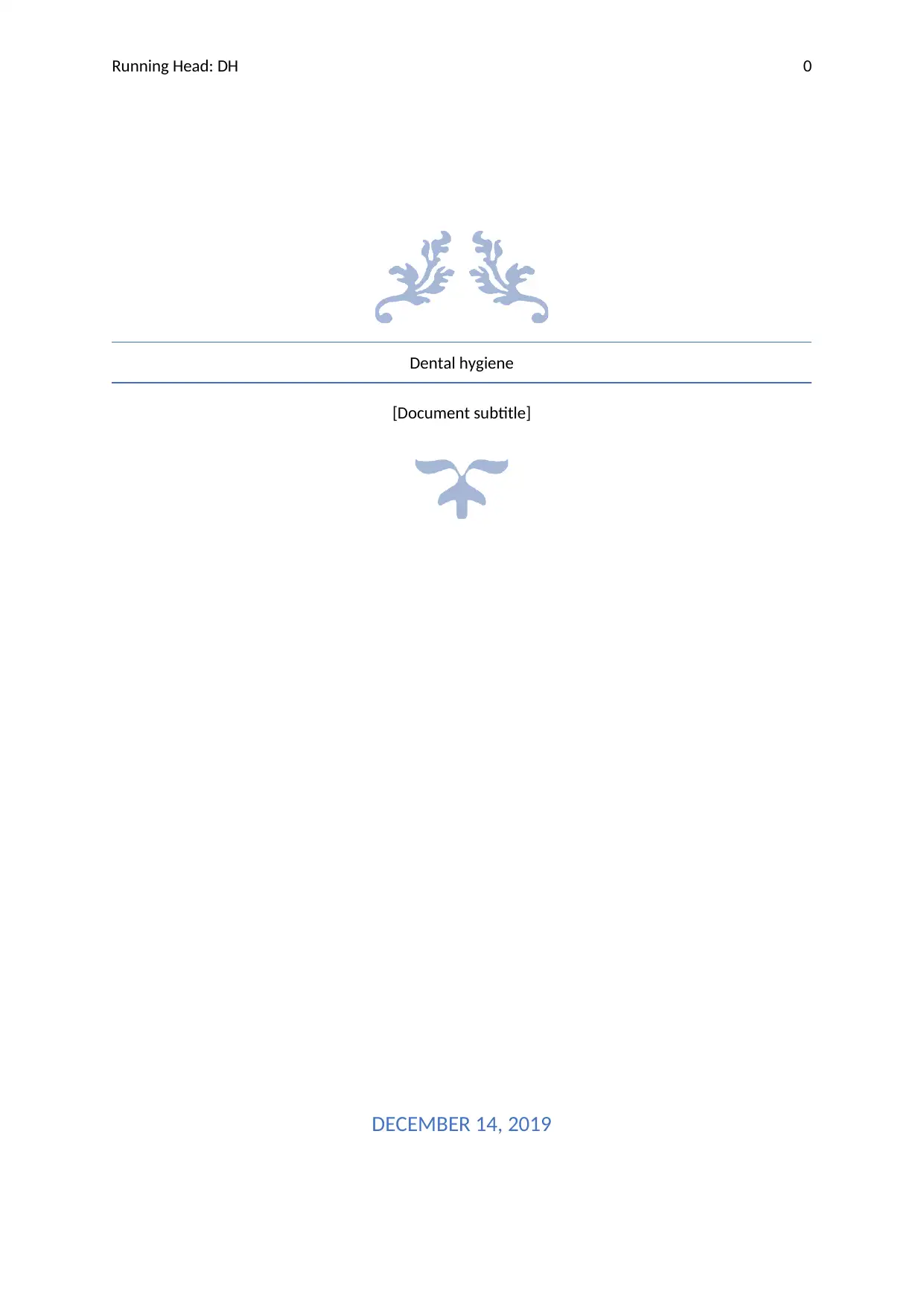
Running Head: DH 0
Dental hygiene
[Document subtitle]
DECEMBER 14, 2019
Dental hygiene
[Document subtitle]
DECEMBER 14, 2019
Paraphrase This Document
Need a fresh take? Get an instant paraphrase of this document with our AI Paraphraser

DH 1
Table of Contents
Background............................................................................................................................................2
Impacts on dental hygiene................................................................................................................2
Pros and cons....................................................................................................................................3
References.............................................................................................................................................5
Table of Contents
Background............................................................................................................................................2
Impacts on dental hygiene................................................................................................................2
Pros and cons....................................................................................................................................3
References.............................................................................................................................................5
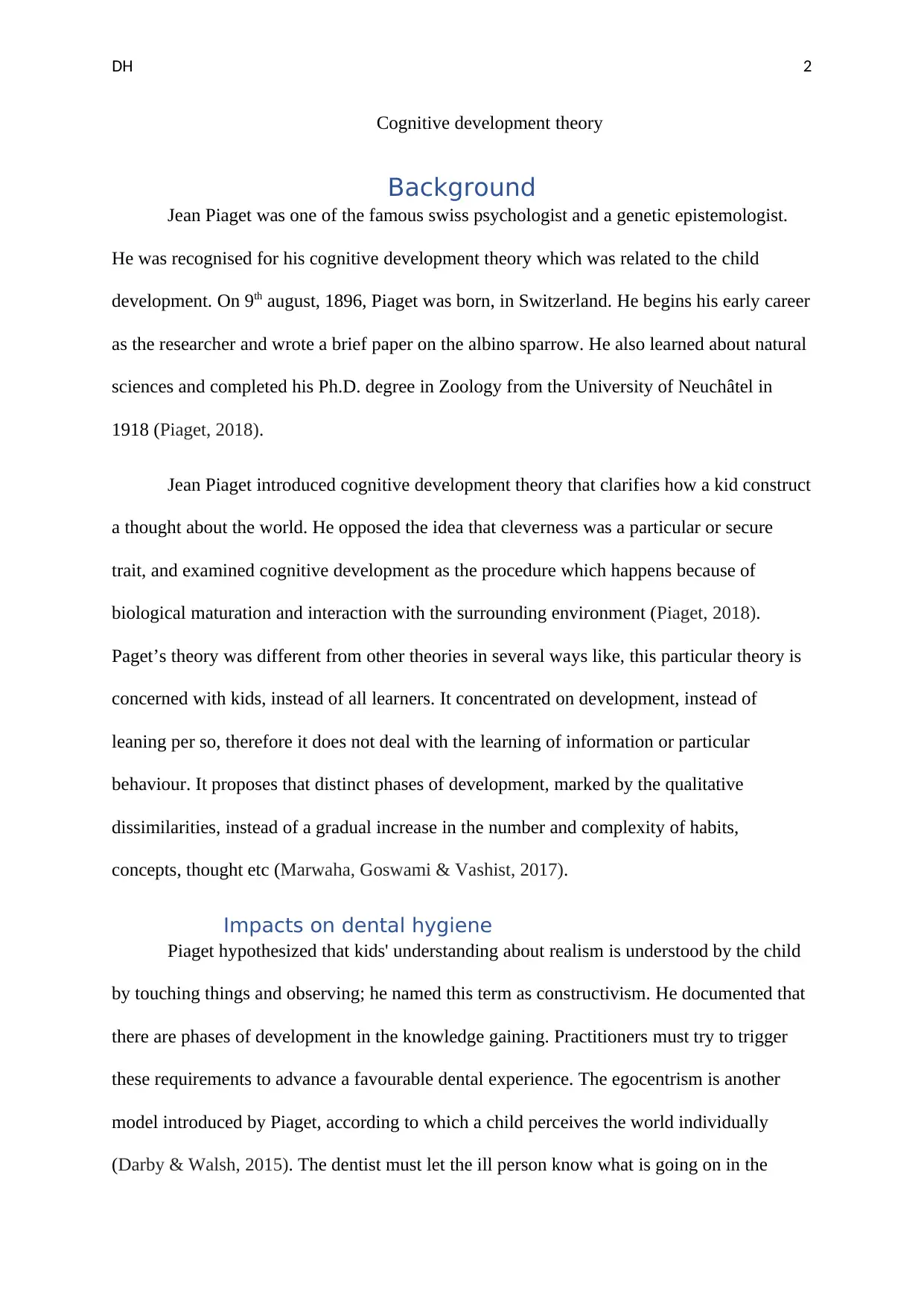
DH 2
Cognitive development theory
Background
Jean Piaget was one of the famous swiss psychologist and a genetic epistemologist.
He was recognised for his cognitive development theory which was related to the child
development. On 9th august, 1896, Piaget was born, in Switzerland. He begins his early career
as the researcher and wrote a brief paper on the albino sparrow. He also learned about natural
sciences and completed his Ph.D. degree in Zoology from the University of Neuchâtel in
1918 (Piaget, 2018).
Jean Piaget introduced cognitive development theory that clarifies how a kid construct
a thought about the world. He opposed the idea that cleverness was a particular or secure
trait, and examined cognitive development as the procedure which happens because of
biological maturation and interaction with the surrounding environment (Piaget, 2018).
Paget’s theory was different from other theories in several ways like, this particular theory is
concerned with kids, instead of all learners. It concentrated on development, instead of
leaning per so, therefore it does not deal with the learning of information or particular
behaviour. It proposes that distinct phases of development, marked by the qualitative
dissimilarities, instead of a gradual increase in the number and complexity of habits,
concepts, thought etc (Marwaha, Goswami & Vashist, 2017).
Impacts on dental hygiene
Piaget hypothesized that kids' understanding about realism is understood by the child
by touching things and observing; he named this term as constructivism. He documented that
there are phases of development in the knowledge gaining. Practitioners must try to trigger
these requirements to advance a favourable dental experience. The egocentrism is another
model introduced by Piaget, according to which a child perceives the world individually
(Darby & Walsh, 2015). The dentist must let the ill person know what is going on in the
Cognitive development theory
Background
Jean Piaget was one of the famous swiss psychologist and a genetic epistemologist.
He was recognised for his cognitive development theory which was related to the child
development. On 9th august, 1896, Piaget was born, in Switzerland. He begins his early career
as the researcher and wrote a brief paper on the albino sparrow. He also learned about natural
sciences and completed his Ph.D. degree in Zoology from the University of Neuchâtel in
1918 (Piaget, 2018).
Jean Piaget introduced cognitive development theory that clarifies how a kid construct
a thought about the world. He opposed the idea that cleverness was a particular or secure
trait, and examined cognitive development as the procedure which happens because of
biological maturation and interaction with the surrounding environment (Piaget, 2018).
Paget’s theory was different from other theories in several ways like, this particular theory is
concerned with kids, instead of all learners. It concentrated on development, instead of
leaning per so, therefore it does not deal with the learning of information or particular
behaviour. It proposes that distinct phases of development, marked by the qualitative
dissimilarities, instead of a gradual increase in the number and complexity of habits,
concepts, thought etc (Marwaha, Goswami & Vashist, 2017).
Impacts on dental hygiene
Piaget hypothesized that kids' understanding about realism is understood by the child
by touching things and observing; he named this term as constructivism. He documented that
there are phases of development in the knowledge gaining. Practitioners must try to trigger
these requirements to advance a favourable dental experience. The egocentrism is another
model introduced by Piaget, according to which a child perceives the world individually
(Darby & Walsh, 2015). The dentist must let the ill person know what is going on in the
⊘ This is a preview!⊘
Do you want full access?
Subscribe today to unlock all pages.

Trusted by 1+ million students worldwide
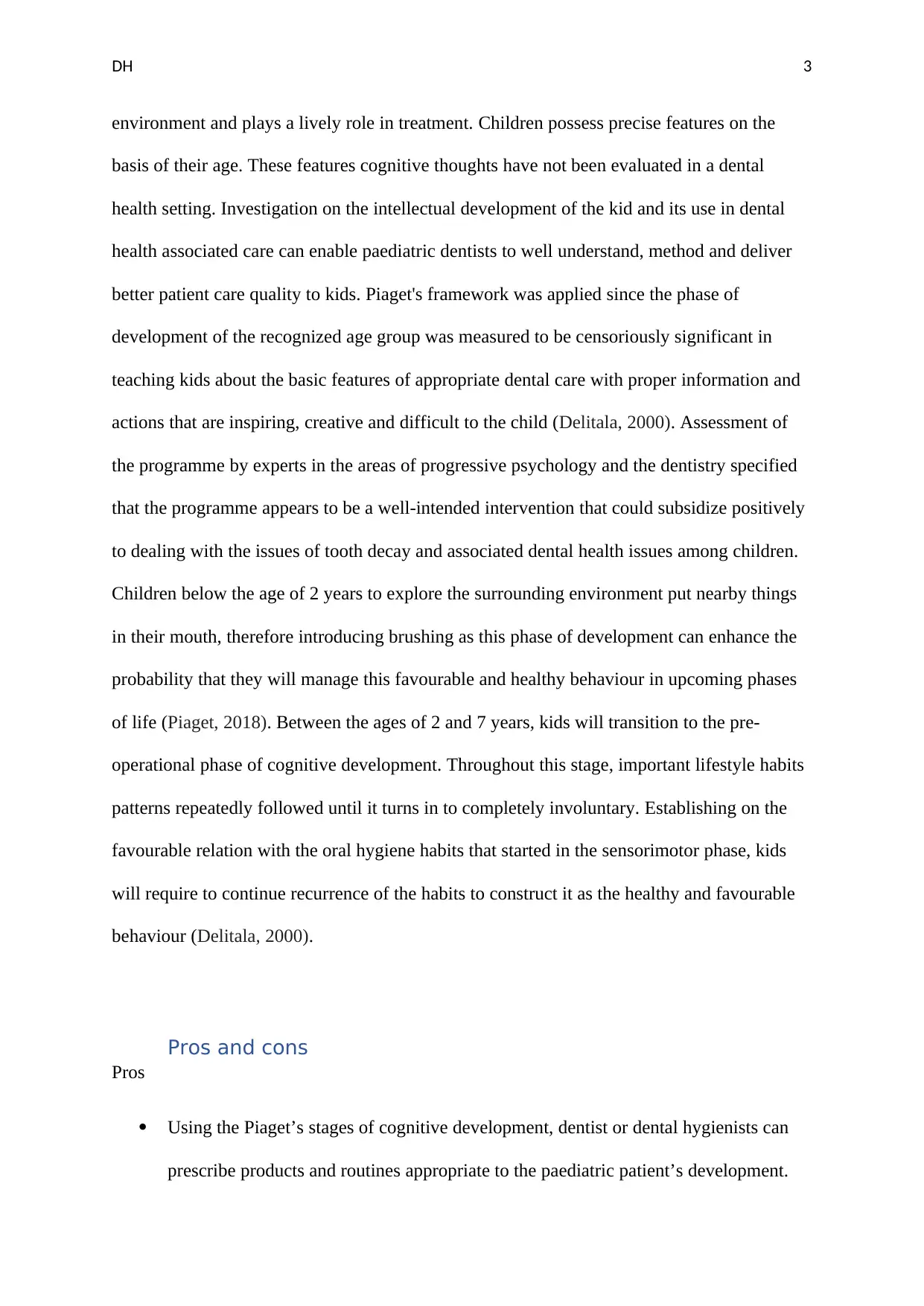
DH 3
environment and plays a lively role in treatment. Children possess precise features on the
basis of their age. These features cognitive thoughts have not been evaluated in a dental
health setting. Investigation on the intellectual development of the kid and its use in dental
health associated care can enable paediatric dentists to well understand, method and deliver
better patient care quality to kids. Piaget's framework was applied since the phase of
development of the recognized age group was measured to be censoriously significant in
teaching kids about the basic features of appropriate dental care with proper information and
actions that are inspiring, creative and difficult to the child (Delitala, 2000). Assessment of
the programme by experts in the areas of progressive psychology and the dentistry specified
that the programme appears to be a well-intended intervention that could subsidize positively
to dealing with the issues of tooth decay and associated dental health issues among children.
Children below the age of 2 years to explore the surrounding environment put nearby things
in their mouth, therefore introducing brushing as this phase of development can enhance the
probability that they will manage this favourable and healthy behaviour in upcoming phases
of life (Piaget, 2018). Between the ages of 2 and 7 years, kids will transition to the pre-
operational phase of cognitive development. Throughout this stage, important lifestyle habits
patterns repeatedly followed until it turns in to completely involuntary. Establishing on the
favourable relation with the oral hygiene habits that started in the sensorimotor phase, kids
will require to continue recurrence of the habits to construct it as the healthy and favourable
behaviour (Delitala, 2000).
Pros and cons
Pros
Using the Piaget’s stages of cognitive development, dentist or dental hygienists can
prescribe products and routines appropriate to the paediatric patient’s development.
environment and plays a lively role in treatment. Children possess precise features on the
basis of their age. These features cognitive thoughts have not been evaluated in a dental
health setting. Investigation on the intellectual development of the kid and its use in dental
health associated care can enable paediatric dentists to well understand, method and deliver
better patient care quality to kids. Piaget's framework was applied since the phase of
development of the recognized age group was measured to be censoriously significant in
teaching kids about the basic features of appropriate dental care with proper information and
actions that are inspiring, creative and difficult to the child (Delitala, 2000). Assessment of
the programme by experts in the areas of progressive psychology and the dentistry specified
that the programme appears to be a well-intended intervention that could subsidize positively
to dealing with the issues of tooth decay and associated dental health issues among children.
Children below the age of 2 years to explore the surrounding environment put nearby things
in their mouth, therefore introducing brushing as this phase of development can enhance the
probability that they will manage this favourable and healthy behaviour in upcoming phases
of life (Piaget, 2018). Between the ages of 2 and 7 years, kids will transition to the pre-
operational phase of cognitive development. Throughout this stage, important lifestyle habits
patterns repeatedly followed until it turns in to completely involuntary. Establishing on the
favourable relation with the oral hygiene habits that started in the sensorimotor phase, kids
will require to continue recurrence of the habits to construct it as the healthy and favourable
behaviour (Delitala, 2000).
Pros and cons
Pros
Using the Piaget’s stages of cognitive development, dentist or dental hygienists can
prescribe products and routines appropriate to the paediatric patient’s development.
Paraphrase This Document
Need a fresh take? Get an instant paraphrase of this document with our AI Paraphraser
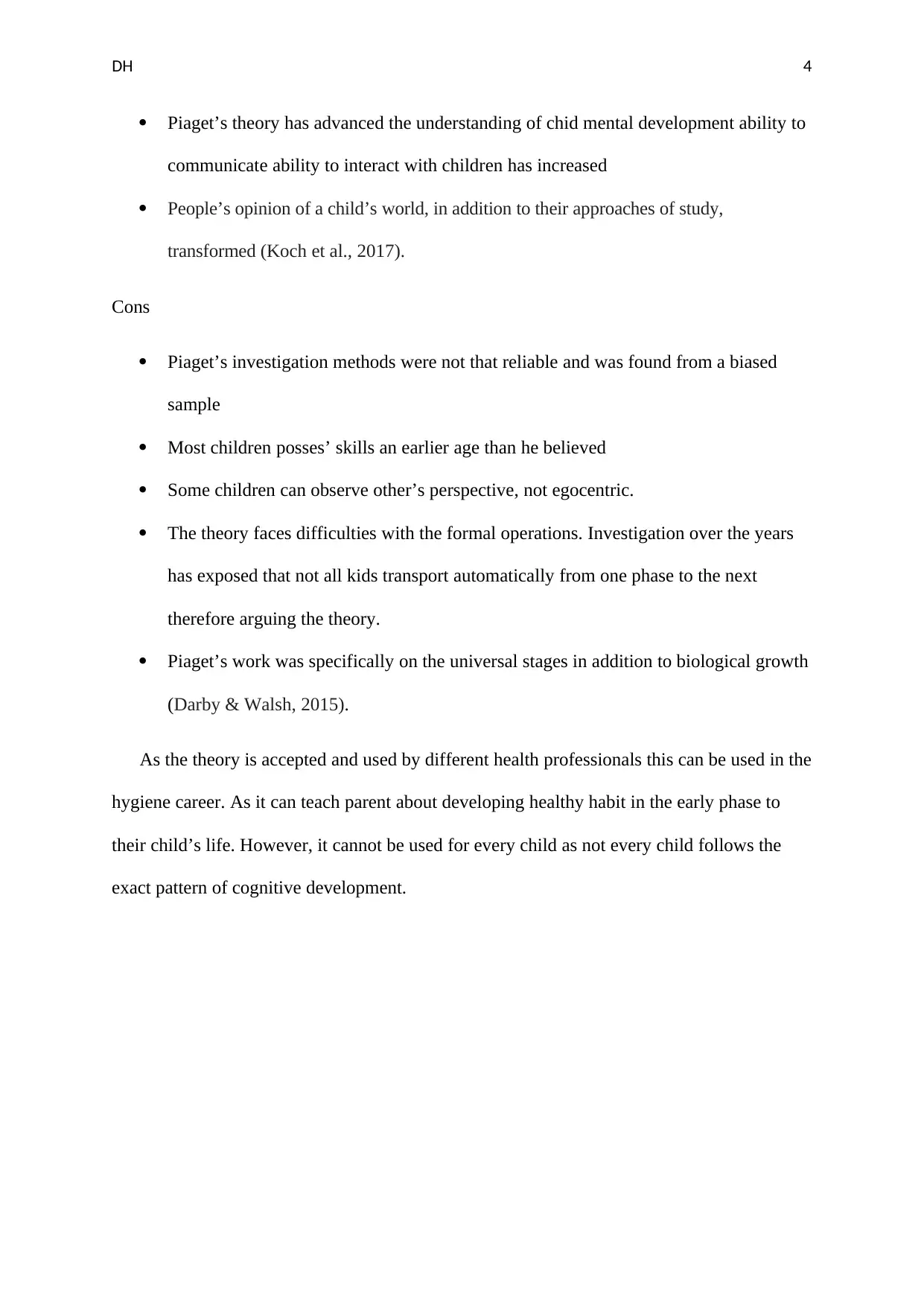
DH 4
Piaget’s theory has advanced the understanding of chid mental development ability to
communicate ability to interact with children has increased
People’s opinion of a child’s world, in addition to their approaches of study,
transformed (Koch et al., 2017).
Cons
Piaget’s investigation methods were not that reliable and was found from a biased
sample
Most children posses’ skills an earlier age than he believed
Some children can observe other’s perspective, not egocentric.
The theory faces difficulties with the formal operations. Investigation over the years
has exposed that not all kids transport automatically from one phase to the next
therefore arguing the theory.
Piaget’s work was specifically on the universal stages in addition to biological growth
(Darby & Walsh, 2015).
As the theory is accepted and used by different health professionals this can be used in the
hygiene career. As it can teach parent about developing healthy habit in the early phase to
their child’s life. However, it cannot be used for every child as not every child follows the
exact pattern of cognitive development.
Piaget’s theory has advanced the understanding of chid mental development ability to
communicate ability to interact with children has increased
People’s opinion of a child’s world, in addition to their approaches of study,
transformed (Koch et al., 2017).
Cons
Piaget’s investigation methods were not that reliable and was found from a biased
sample
Most children posses’ skills an earlier age than he believed
Some children can observe other’s perspective, not egocentric.
The theory faces difficulties with the formal operations. Investigation over the years
has exposed that not all kids transport automatically from one phase to the next
therefore arguing the theory.
Piaget’s work was specifically on the universal stages in addition to biological growth
(Darby & Walsh, 2015).
As the theory is accepted and used by different health professionals this can be used in the
hygiene career. As it can teach parent about developing healthy habit in the early phase to
their child’s life. However, it cannot be used for every child as not every child follows the
exact pattern of cognitive development.
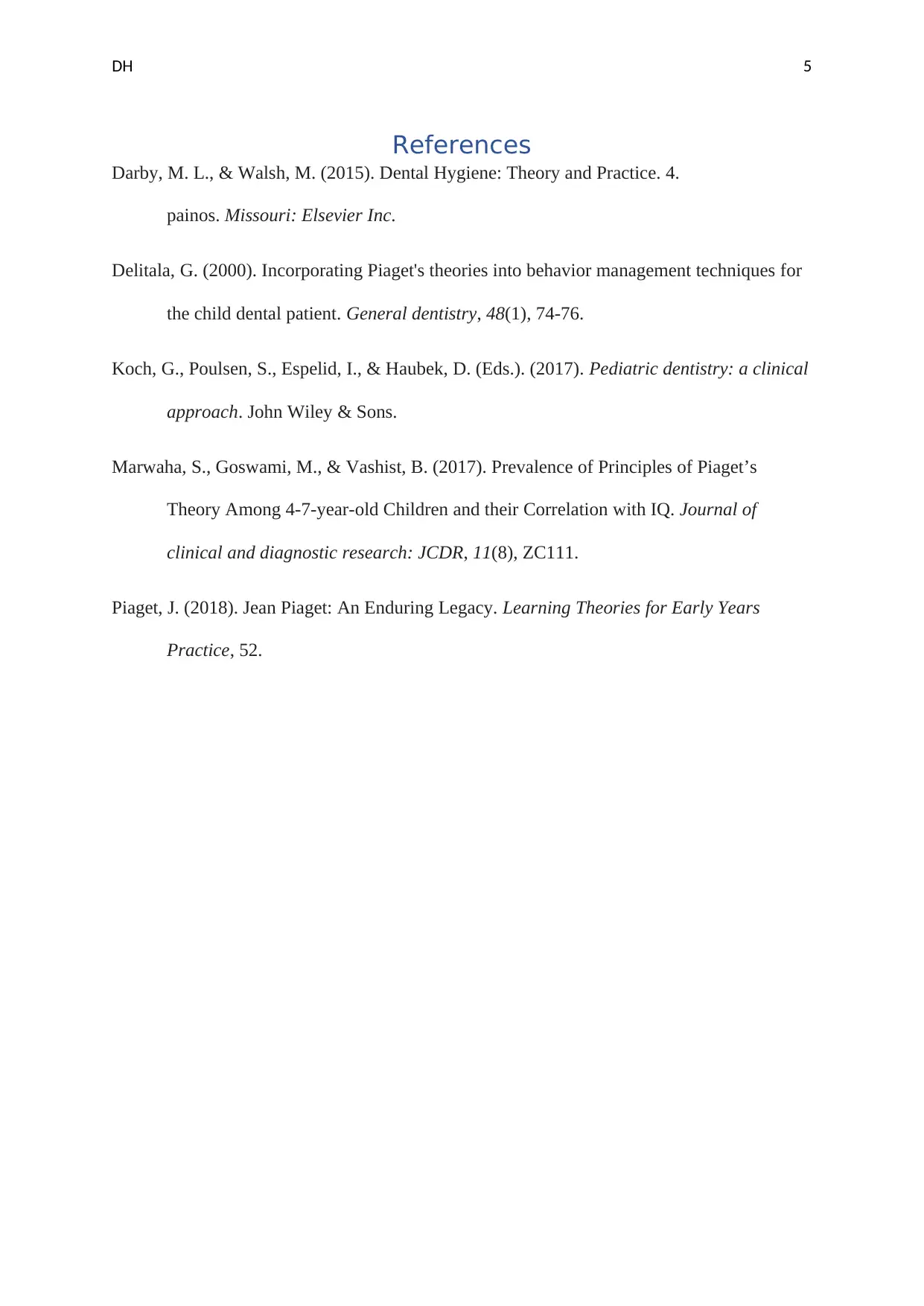
DH 5
References
Darby, M. L., & Walsh, M. (2015). Dental Hygiene: Theory and Practice. 4.
painos. Missouri: Elsevier Inc.
Delitala, G. (2000). Incorporating Piaget's theories into behavior management techniques for
the child dental patient. General dentistry, 48(1), 74-76.
Koch, G., Poulsen, S., Espelid, I., & Haubek, D. (Eds.). (2017). Pediatric dentistry: a clinical
approach. John Wiley & Sons.
Marwaha, S., Goswami, M., & Vashist, B. (2017). Prevalence of Principles of Piaget’s
Theory Among 4-7-year-old Children and their Correlation with IQ. Journal of
clinical and diagnostic research: JCDR, 11(8), ZC111.
Piaget, J. (2018). Jean Piaget: An Enduring Legacy. Learning Theories for Early Years
Practice, 52.
References
Darby, M. L., & Walsh, M. (2015). Dental Hygiene: Theory and Practice. 4.
painos. Missouri: Elsevier Inc.
Delitala, G. (2000). Incorporating Piaget's theories into behavior management techniques for
the child dental patient. General dentistry, 48(1), 74-76.
Koch, G., Poulsen, S., Espelid, I., & Haubek, D. (Eds.). (2017). Pediatric dentistry: a clinical
approach. John Wiley & Sons.
Marwaha, S., Goswami, M., & Vashist, B. (2017). Prevalence of Principles of Piaget’s
Theory Among 4-7-year-old Children and their Correlation with IQ. Journal of
clinical and diagnostic research: JCDR, 11(8), ZC111.
Piaget, J. (2018). Jean Piaget: An Enduring Legacy. Learning Theories for Early Years
Practice, 52.
⊘ This is a preview!⊘
Do you want full access?
Subscribe today to unlock all pages.

Trusted by 1+ million students worldwide
1 out of 6
Related Documents
Your All-in-One AI-Powered Toolkit for Academic Success.
+13062052269
info@desklib.com
Available 24*7 on WhatsApp / Email
![[object Object]](/_next/static/media/star-bottom.7253800d.svg)
Unlock your academic potential
Copyright © 2020–2026 A2Z Services. All Rights Reserved. Developed and managed by ZUCOL.





